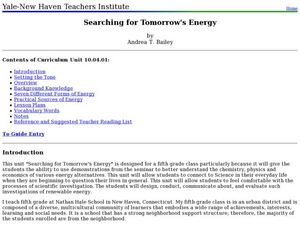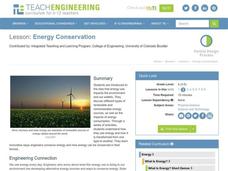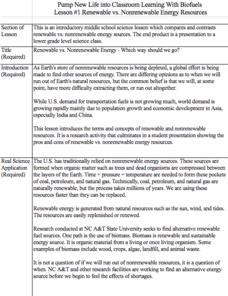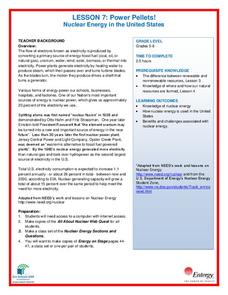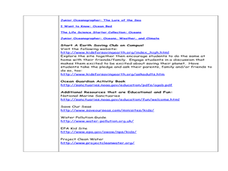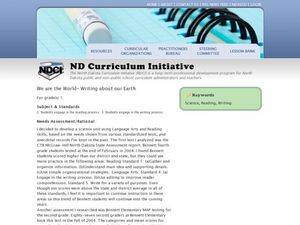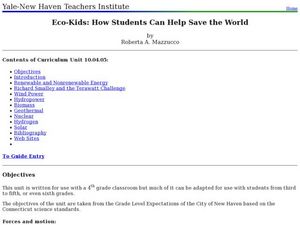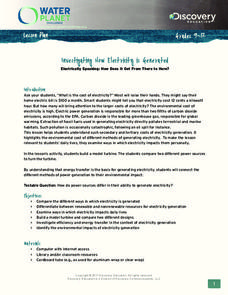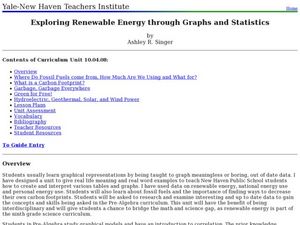Curated OER
Renewable/Nonrenewable Resources
Fourth graders classify resources as renewable or nonrenewable while playing a board game. They read King John story and discuss the story. Students explore renewable and nonrenewable resources. They play the resources game that show...
Curated OER
Current Sources of Energy to Maintain a Sustainable Future
In small groups, fourth graders identify different sources of renewable and non-renewable energy. They research the pros and cons of using each of these resources. They rank household appliances according to energy usage and efficiency....
Curated OER
Searching for Tomorrow's Energy
Fifth graders investigate energy. In this biology lesson plan, 5th graders will learn about energy, fossil fuels, and renewable and nonrenewable resources. Students will be participating in three lab activities which are described in...
Curated OER
Energy Conservation
Students investigate energy conservation. In this energy conservation and analyzing data lesson plan, students identify and explain several energy sources and research renewable and nonrenewable energy sources. Students use statistics...
Kenan Fellows
Renewable vs. Nonrenewable Energy Resources
Is one type of energy inherently good or bad? Young scientists explore energy resources in a week-long unit. After extensive research, groups create powerful position statements and presentations supporting their energy resource of choice.
National Wildlife Federation
Power Pellets! Nuclear Energy in the United States
Nuclear power provides about 20 percent of the energy generated in the United States. The seventh activity in the series of 12 tackles nuclear power. After sharing what they know about nuclear energy, scholars complete a WebQuest make a...
Curated OER
Mission Possible: Energy Trade-offs
Teams of electrical engineers work together to develop plans for increasing electricity to a fictitious, but growing community. They consider different sources of electricity, both renewable and nonrenewable, the cost of building and...
Curated OER
Applied Science - Built Environment (2) Pre Lab
Second graders review how our society affects nature. For this energy lesson, 2nd graders discuss the different ways that energy is collected. They review renewable and nonrenewable energy sources.
Curated OER
SUSTAINABLE AGRISCIENCE
High schoolers, after defining sustainable agriscience, distinguishing between renewable and nonrenewable resources and identify the basic components of a sustainable agriscience system, develop a sustainable agriscience system. They...
Curated OER
I Can Preserve My Planet
Students explore renewable and nonrenewable resources. In this ocean preservation lesson, students use KWL charts to understand ways the ocean is important to our daily lives. Students create a poster or wirte a letter to someone...
Curated OER
Fourth Grade Social Studies
In this social studies worksheet, 4th graders complete multiple choice questions about the Constitution, natural resources, economics, and more. Students complete 25 multiple choice questions.
Curated OER
We are the World - Writing about our Earth
First graders write facts about the Earth. In this Earth lesson plan, 1st graders discuss natural resources, recycling, and how to keep the Earth clean. They work in groups to create a small book with 3-5 facts about the Earth's...
Science Matters
Solar Energy
The solar energy industry in the United States added more jobs in 2015 than the oil and gas extraction and pipeline industries combined. With the field growing so rapidly, it's essential to understand what solar energy is and how it...
Curated OER
Water Is Cool!
Students study water as a non-renewable resource. For this water lesson, students examine sources of water, uses of water, and explain why it is important to take care of water sources for the common good. They research the water cycle...
Curated OER
From Polymers to Bioplastics: Looking Toward Finding Renewable Resources
Students investigate the properties of polymers. For this chemistry lesson, students explain the importance of energy sources. They produce a bioplastic from the lab and evaluate its structural integrity.
Curated OER
Air Pollution
Students seek solutions to environmental problems. They discover how to conserve and protect natural resources. They examine the role of acid rain on plants and discover how to filter pollutants.
Curated OER
Energy: Exploring Alternative Forms
In the study of science, there is always
going to be research, data, theories and wonderful new discoveries. I feel that my interest
about energy will help me design an adequate unit full of intrigue and discovery. The
students should...
Curated OER
Earth Kids: Kindergarteners Taking Care of the Earth
Students explore a variety of ways of how to care for the environment in the nine lessons of this unit. They observe how to be responsible "Earth Kids."
Curated OER
Eco-Kids: How Students Can Help Save the World
Fourth graders identify the different types of renewable and nonrenewable energy sources. In this ecology lesson, 4th graders create models of wind mills and hydropower. They discuss the pros and cons of using alternative forms of energy.
Curated OER
Machines: Designing Form and Function
Students design a boat model with simplified steam engine. In this ecology lesson, students compare renewable and nonrenewable energy sources. They determine the efficiency of their boat model.
EarthEcho International
Investigating How Electricity is Generated
What is the real cost of electricity? The real cost is not just the price you pay, but the environmental and economic costs as well. Scholars build, use, and judge the effectiveness of a turbine. They also investigate the environmental...
Curated OER
Naturally Speaking
Students identify the Earth's natural resources and classify them as renewable or non-renewable. They simulate the distribution of resources and discuss the fairness and effectiveness of the distribution. They identify ways that they use...
Curated OER
Exploring Renewable Energy Through Graphs and Statistics
Ninth graders identify different sources of renewable and nonrenewable energy. In this math lesson, learners calculate their own carbon footprint based on the carbon dioxide they create daily. They use statistics to analyze data on power...
Consumers Energy
The Cost of Electricity
How much is your toaster costing you every day? Young environmentalists calculate the monetary costs of household appliances based on their average consumption of wattage.




